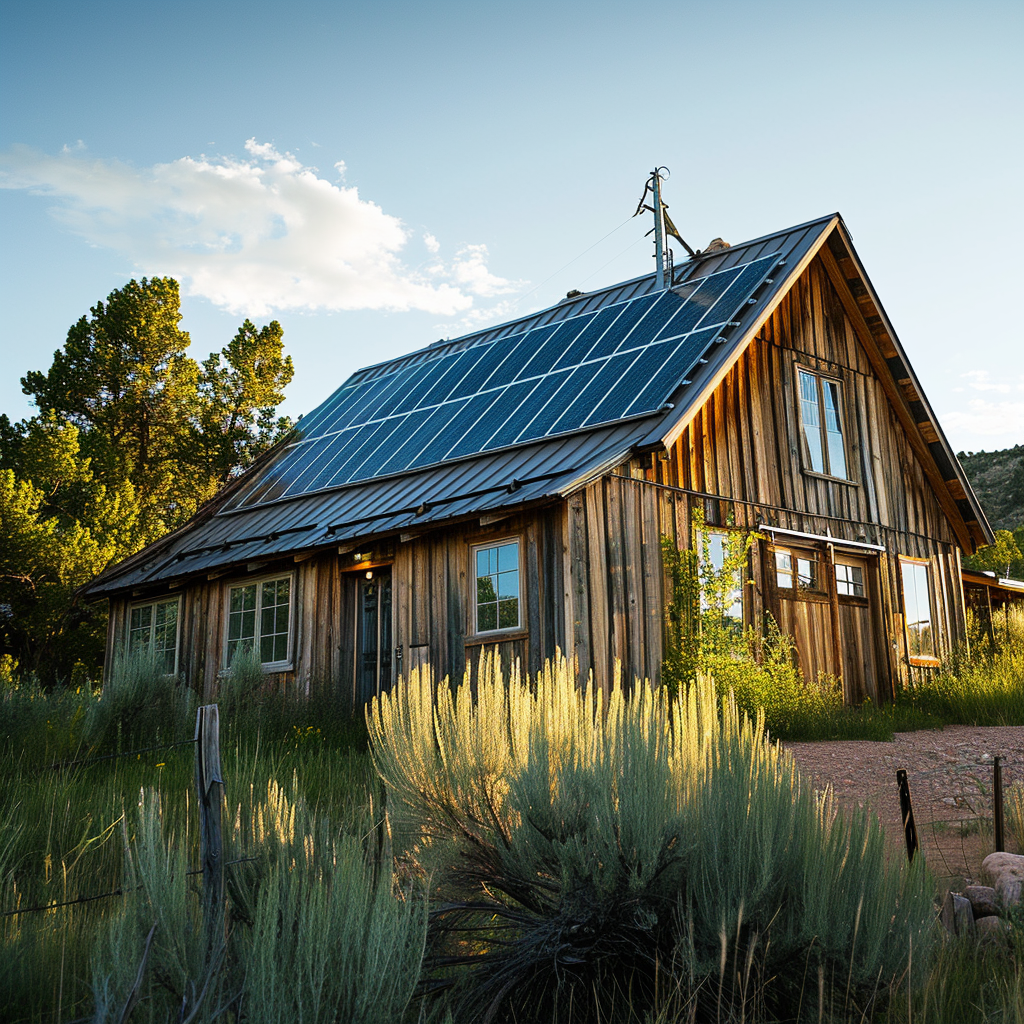Introduction
To understand off-grid living, delve into its core concepts: what it means to live off-grid and the growing popularity of this lifestyle. But do off-gridders pay taxes? Explore the benefits and challenges of going off-grid, as well as the implications it has on taxes. Gain insights into the complexities of financial responsibilities in a self-reliant and independent way of life.
What is off-grid living?
Off-grid living is an independent lifestyle from public utilities like electricity, water, and gas. It uses renewable sources such as solar panels and wind turbines to generate power. This lifestyle encourages self-reliance, sustainability, and connection with nature.
Advantages of this lifestyle include:
- Control over energy consumption and lower utility bills from renewable sources.
- Conservation of resources by composting, recycling, and reusing materials.
To live off-grid, one needs to make adjustments. Investing in quality solar panels is important for efficient solar energy. Using LED lights instead of traditional ones reduces energy use.
Water management involves collecting rainwater in storage tanks and using water-saving technologies. Waste management is important too. Composting organic waste reduces landfill usage and produces soil for gardening. Recycling materials like paper, plastic, and glass minimizes environmental impact.
Growing popularity of off-grid living
Living off-grid is becoming a popular trend, due to its many benefits. Off-grid living means living independently, without relying on public utilities, such as electricity and water supply. It gives people the freedom to live sustainably, while being disconnected from traditional systems and taking on self-sufficiency.
- Self-sustainability: People who live off-grid make their own energy with solar panels and wind turbines. This reduces their need for fossil fuels and helps conserve the environment.
- Cost savings: By generating their own power and collecting rainwater, off-gridders can save money on bills. This financial independence appeals to those looking for an affordable lifestyle.
- Reduced carbon footprint: Off-grid living encourages sustainable practices, such as composting, recycling, and using alternative energy sources. This contributes to reducing greenhouse gas emissions.
- Connection with nature: Living off-grid gives individuals the chance to reconnect with nature. Surrounded by natural landscapes, they can find the peace that is often missing in urban areas.
- Increased self-reliance: Off-gridders must learn important skills, like growing food, purifying water, and fixing infrastructure. This fosters independence and resilience.
- Simplicity and minimalism: Without needing excessive possessions or consumption, off-gridders often lead simpler lives. Minimalism is a key part of their day-to-day.
Off-grid communities are springing up around the world, as people look for different ways of life. These communities offer support and shared experiences that can improve off-gridders’ quality of life.
Take Joanne’s story – she wanted to escape the city’s hustle and pollution, so she made the decision to move off-grid. With her husband, she built a sustainable home powered by solar panels and practiced permaculture principles. Now, Joanne lives in harmony with nature, enjoying the simplicity and freedom of off-grid living.
The growing popularity of off-grid living reflects people’s desire for a better, more sustainable lifestyle. As this movement grows, it challenges us to rethink our relationship with the environment. Whether it’s for financial reasons or a deeper connection to nature, off-grid living opens up new possibilities and sets us on the path to a greener future.
Understanding the tax system
To develop a strong grasp of the tax system, dive into the section on understanding the tax system with an overview of the tax system, different types of taxes, and how taxes are typically paid. Delve into the intricacies of taxes, making sense of this complex system while gaining insight into its various aspects.
Overview of the tax system
Taxes are financial obligations imposed by governments. They are collected to generate revenue and fund public services. Tax systems include various types of taxes, like income, sales, property, and corporate taxes.
Income tax is based on people’s income from various sources. Sales tax is calculated as a percentage of the selling price, and paid by the consumer. Property tax is assessed on real estate properties. Corporate tax applies to businesses’ profits.
The history of the modern tax system dates back to ancient civilizations, such as Egypt and Mesopotamia. Over the centuries, taxes have been used to finance wars, infrastructure projects, and redistribute wealth. The concept has evolved from simple tribute payments to more sophisticated systems.
The present-day tax system reflects centuries of balancing between meeting government needs and ensuring fairness and economic growth. It is still a topic of debate, with discussions about simplification, efficiency, and potential reforms.
Different types of taxes
Let’s take a glance at taxes in a table format:
| Types of Taxes | |
|---|---|
| Income Tax | Property Tax |
| Corporate Tax | Capital Gains Tax |
| Estate Tax |
Income tax is charged for an individual’s or business income. Property tax is linked to the real estate value. Sales tax is taken when goods or services are bought.
Suggestions for taxation:
- Keep accurate records. This helps calculate tax liability and claim deductions.
- Get professional help. It ensures complying with changing tax laws and optimizing tax-saving chances.
- Understand deductions to lower taxable income legally.
- Plan for retirement. It offers tax advantages and safeguards the future.
- Stay informed about new regulations to be compliant and avoid penalties.
By following these steps, taxpayers can manage the complex tax system while maximizing their financial well-being. Payment of taxes is like playing ‘Hide and Seek’ with the government, but they always find your money!
How taxes are typically paid
To comprehend taxes, they must be understood. Here’s a 5-step guide to help:
- Determine your tax liability – Assess income and expenditure. Do this independently or get help from a professional.
- Understand payment options – Familiarize yourself with online payments, direct debit, checks and third-party services.
- Submit necessary forms and documents – Fill out paperwork quickly to avoid penalties.
- Stay informed about deadlines – Pay attention to filing and estimated tax payment due dates.
- Review payment confirmation – Check receipts, bank statements and online records for accuracy.
Taxes vary from country to country and even within nations. Consult local regulations and seek help.
Now for some unique details about taxes without the technical jargon:
Different countries use taxation tailored to their economy and social goals. Some rely on income taxes, others on value-added and sales taxes. Some countries have progressive tax rates based on income.
Meet Sarah, an accountant navigating taxes. Each year she organizes records and seeks deductions. She pays on time to avoid penalties and checks her payment is accurate. Paying taxes is a part of contributing to society.
Tax obligations for off-gridders: Karma won’t work, but the taxman will.

Tax obligations for off-gridders
To ensure you understand the tax obligations as an off-gridder, let’s dive into the legal framework and factors impacting these obligations. We’ll also address common misconceptions you may have about off-gridders and taxes. Explore the sub-sections: Legal framework for tax obligations, Factors affecting tax obligations, Common misconceptions about off-gridders and taxes.
Legal framework for tax obligations
Tax obligations are key for off-gridders. Knowing the confusing system is essential to stay compliant and avoid penalties. It’s necessary to file taxes accurately and on time – or the consequences can be severe.
Understanding the tax regulations involves understanding applicable laws and guidelines. Off-gridders must know about federal and state tax requirements. Get familiar with the IRS rules on income, deductions, and credits.
It’s important to note that living off-grid does not mean no taxes. Even if you generate your own electricity or grow your own food, you might still have to pay property or sales tax.
Pro Tip: Get help from a specialist in off-grid taxation. This can help you stay on top of the ever-changing tax landscape and prevent surprises at tax season. Tax obligations depend on income level, deductions, and the fact that the government always takes its share.
Factors affecting tax obligations
A table can show factors that influence tax obligations. It might have columns like income sources, residency status, deductions and credits, investments, and business ownership. This visual representation helps people understand their own circumstances and assess tax obligations.
On top of that, there are local or national tax laws, specific exemptions or concessions, and unexpected life events that can have financial implications. Knowing these details helps people accurately assess their tax obligations and take action.
Don’t forget any factors that could affect your tax obligations. Missing your tax responsibilities can lead to penalties, fines, or even legal consequences. Staying informed and regularly reviewing your situation can help avoid problems and missed opportunities.
Common misconceptions about off-gridders and taxes
Off-gridders must pay taxes. Contrary to what some think, living off the grid does not make you exempt. Income tax, property tax and sales tax must all be paid, just like everyone else.
Determining taxable income is tricky for off-gridders. They generate electricity and grow food, making it hard to assess income accurately. They still have to report income from outside sources.
Here’s a tip: if you live off the grid, learn about taxes and get professional help if needed. Ignorance can cause issues in the future.
Tax benefits and exemptions for off-gridders
To maximize tax benefits and exemptions for off-gridders, explore government incentives for off-grid living, specific tax deductions and exemptions, and case studies of successful tax planning for off-gridders.
Government incentives for off-grid living
Living off-grid has many advantages! Property taxes can be reduced as homes are often smaller and require fewer public services. Governments provide tax credits for solar panel installation, making clean energy more accessible. Renewable energy grants and water usage incentives are also available for those wanting to invest in systems like wind turbines or rainwater harvesting.
In some countries, subsidies and grants for energy-efficient appliances or building materials are offered too. It’s important to research local regulations and government programs to know what’s available in your area.
Don’t miss out on the potential rewards of off-grid living. Take advantage of these incentives and save money while helping the environment. Start your sustainable journey today!
Specific tax deductions and exemptions
Off-gridders can reap tax benefits! Renewable Energy Credits, Energy-Efficient Appliance Credits, as well as Home Office Deduction are just some of the available exemptions. If circumstances are unique, a tax pro specializing in sustainable living or alternative energy can help maximize the advantages.
Mary is one example. Solar panel installation and energy-efficient appliances gave her ample credits. Moreover, her home office deduction helped with her taxable income. These tax benefits offset the initial cost of switching to off-grid living, allowing her to continue her sustainable lifestyle feeling secure.
Going green has its rewards – one of which is tax savings!
Case studies of successful tax planning for off-gridders
Professionals have researched successful tax plans for off-gridders. They looked at strategies used by people living off the grid to cut their taxes. Let’s look at some real examples!
Case Studies of Successful Tax Planning for Off-Gridders:
| Name | Location | Strategy | Result |
|---|---|---|---|
| John S. | California | Renewable Energy Credits | $2,500 savings p.a. |
| Emma W. | Colorado | Homestead Exemption | Property tax relief |
| James M. | Arizona | Investment Tax Deductions | $5,000 savings on solar investment |
These studies show how each person’s approach to tax planning helped them out. Their strategies led to great money benefits.
To keep taxes low and sustainable, it’s good to take advantage of incentives and exemptions. For example, John S. from California saved $2,500 annually with renewable energy credits. Emma W. from Colorado got property tax relief with the homestead exemption. James M. in Arizona got $5,000 off solar investments with investment tax deductions.
To get the most out of taxes as an off-gridder:
- Check out state-specific programs.
- Record energy production thoroughly.
- Get help from a tax advisor.
- Stay up-to-date with changes in regulations.
By using these strategies and staying informed, off-gridders can save money while enjoying an independent lifestyle.
Challenges and considerations for off-gridders: Don’t forget, it’s not just taxes you need to dodge, but the irony of trying to stay off the grid while constantly dealing with low battery on your smartphone.

Challenges and considerations
To navigate the challenges and considerations faced by off-gridders regarding taxes, explore the potential pitfalls of not paying taxes, learn how to navigate tax regulations as an off-gridder, and find a balance between self-sufficiency and tax obligations. Discover strategies and insights to ensure compliance and make informed decisions within the off-grid lifestyle.
Potential pitfalls of not paying taxes
Not paying taxes can bring some serious risks. For instance, there could be legal consequences like fines, penalties, and even jail time. Plus, your credit score may take a hit, making it harder to get loans or credit in the future. You may even lose eligibility for government benefits and programs.
So, to avoid these pitfalls, you should prioritize tax payments. Here’s how:
- Keep records – receipts, invoices, etc. – to report income and expenses accurately.
- Hire a qualified tax professional to help you understand regulations and identify deductions/credits.
- Set aside funds for taxes.
- Learn about the specific tax regulations that apply to you.
These steps can help you pay taxes on time and stay compliant. This way, you can protect your financial wellbeing.
Navigating tax regulations as an off-gridder
To tackle tax regulations as an off-gridder, here’s a 5-step guide:
- Determine your tax obligations. Consult with a qualified professional who specializes in renewable energy or sustainable living.
- Identify applicable tax credits and incentives. Research any federal, state or local tax credits and incentives you may be eligible for.
- Keep accurate records. Track all expenses related to your off-grid system – purchase and installation costs, maintenance expenses, and changes/upgrades.
- Maximize deductions. Deduct costs associated with your off-grid system, like repairs and upgrades.
- Seek professional advice. Get help from a qualified tax professional to optimize your tax strategy.
Remember, unique details come into play when navigating tax regulations as an off-gridder. Consider researching local regulations, investing in professional tax assistance, and staying updated on relevant tax laws. This will help you navigate taxes effectively while maximizing benefits and minimizing potential risks.
Balancing self-sufficiency with tax obligations
Finding the right balance between self-sufficiency and tax obligations is important. It needs careful pondering of various factors to stay compliant with taxes and keep financial liberty.
- 1. Knowing the applicable regulations for your situation is a must. Different places have varying rules about self-employment, income declaration, deductions, and exemptions. Staying up to date with these will make it simpler to understand taxation.
- 2. Keeping precise records of income and expenses is vital. This not only helps you meet your tax obligations but also shows your financial health. Having receipts, invoices, bank statements, and other relevant documents ensures that all deductions are appropriate and any issues during audits can be avoided.
- Lastly, getting help from skilled accountants or tax advisors can be of great help in balancing self-sufficiency with tax obligations. They know precisely how to study your financial situation and direct you on how to optimize your position, and still follow the law.
It is also necessary to be aware of the ever-changing regulations of tax. Modifications in the law can significantly alter your liabilities and give incentives for self-sufficiency. Examining and adjusting strategies to cope with such changes will make sure you take a proactive approach in keeping this delicate equilibrium.
Recognizing the significance of this balance between self-sufficiency and tax obligations helps individuals and businesses make their way through this complex landscape. Being informed, proactive, and accurate in your financial management will not only guarantee your compliance but also lead to sustainable success.
Conclusion
Comprehending tax duties for off-gridders is vital. They must get to grips with the details of their taxes to obey laws and evade fines. With off-grid living becoming more popular, individuals should be aware of the taxes linked with this lifestyle.
Not only do off-gridders have to understand their income taxes, but they must also be familiar with land taxes, sales taxes, and any other taxes that affect them. Knowing these duties lets off-gridders report their earnings properly and pay the right amount of taxes.
A unique point yet to be discussed is the potential benefits of understanding tax obligations as an off-gridder. By knowing how to manage the tax system and use deductions or credits, off-gridders can reduce their overall tax liability and possibly increase their savings.
Additionally, keeping accurate records is essential for off-gridders. This makes it easier for them to report their income and expenses accurately when it’s time to file taxes. By keeping their records tidy, off-gridders can stop any IRS audits or problems.
Moreover, looking for professional help may be useful for those who are uncertain about their tax duties as an off-gridder. Hiring a knowledgeable accountant or tax advisor who knows off-grid living can give helpful advice and make sure all taxes are handled properly.
To sum up, understanding tax obligations is critical for off-gridders. This lets them follow the law, take advantage of benefits, and dodge penalties. By staying informed and getting professional assistance when needed, off-gridders can manage the complexities of the tax system with confidence.




